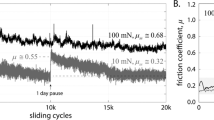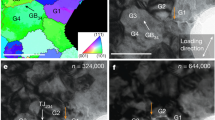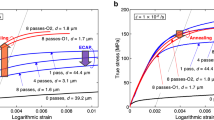Abstract
RECENTLY, it was reported that fatiguing (cyclic straining) at room temperature results in observable diffusion of silver into copper at that temperature1. This important effect was attributed to the athermal generation and the subsequent diffusion of vacancies which are greatly in excess of equilibrium.
This is a preview of subscription content, access via your institution
Access options
Subscribe to this journal
Receive 51 print issues and online access
$199.00 per year
only $3.90 per issue
Buy this article
- Purchase on Springer Link
- Instant access to full article PDF
Prices may be subject to local taxes which are calculated during checkout
Similar content being viewed by others
References
Derrick Jones, W. J., and Dover, W. D., Nature, 209, 704 (1966).
Kelly, A., and Nicholson, R. B., in Prog. Materials Sci., 10, (Macmillan and Co., 1963).
Roberge, R., and Herman, H., (to be published).
Seitz, F., Adv. in Phys., 1, 43 (1952).
Author information
Authors and Affiliations
Rights and permissions
About this article
Cite this article
ROBERGE, R., HERMAN, H. Fatigue—Generation of Vacancies. Nature 211, 178–179 (1966). https://doi.org/10.1038/211178b0
Issue Date:
DOI: https://doi.org/10.1038/211178b0
This article is cited by
-
Defect structures in fatigued Al-6.5 at. pet Zn alloy
Metallurgical Transactions (1972)
-
Detection of plastic microstrain in aluminum by acoustic emission
Metallurgical Transactions (1970)
Comments
By submitting a comment you agree to abide by our Terms and Community Guidelines. If you find something abusive or that does not comply with our terms or guidelines please flag it as inappropriate.



